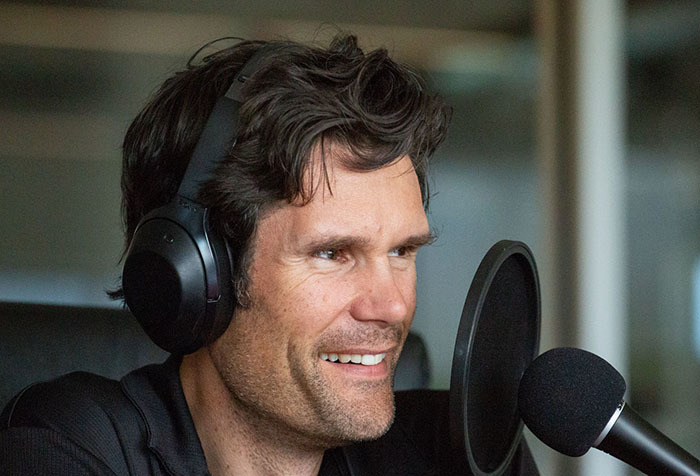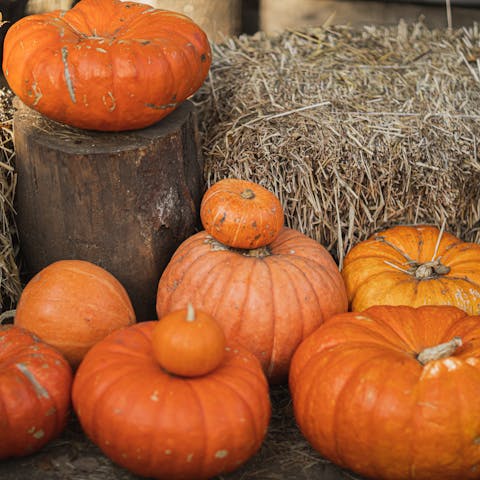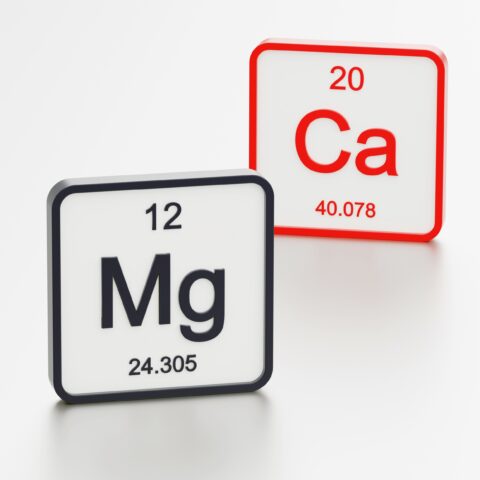Naturally and Artificially Sweetened Beverages are Associated with Dementia and Alzheimer’s According to Two Recent Studies
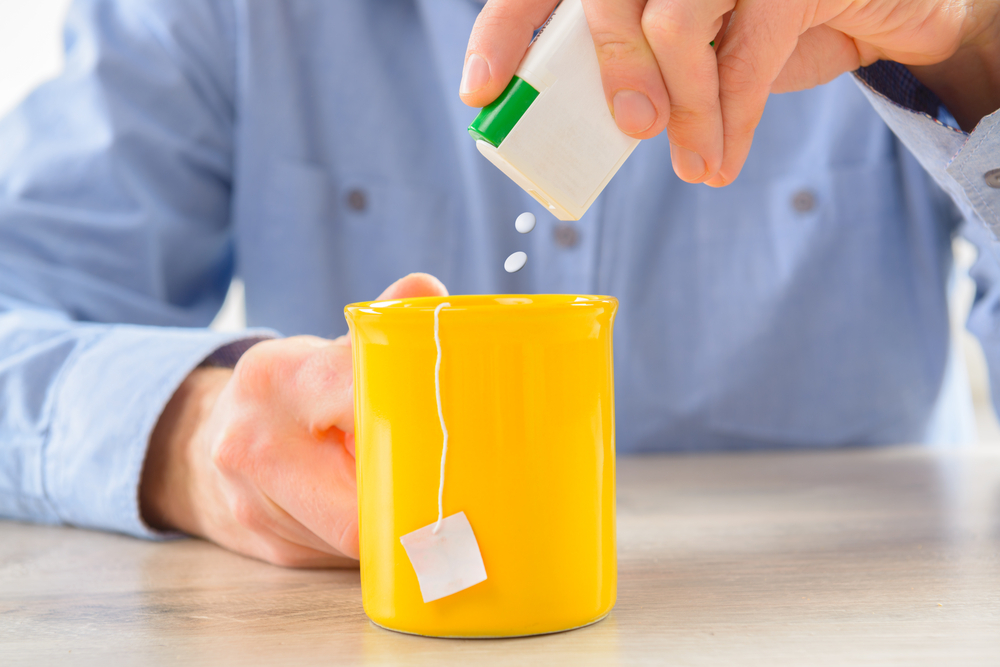
While there was likely never a time when your doctor would have told you to consume more sugar, a growing body of research is demonstrating just how pervasive the negative health effects of over consuming simple carbohydrates such as glucose, fructose, and sucrose truly are [1-4].
In fact, sounding like they took a page from a Tom Clancy novel, a series of recent peer-reviewed articles showed that for decades, the sugar industry was aware of the impact of sugar on cardiovascular disease (CVD) risk and worked to hide it; pointing the finger at fat consumption instead [5, 6]. A misdirection that contributed to years of poor dietary guidelines.
Sugary drinks such as soft drinks and even 100% fruit juice are some of the biggest contributors to excess sugar consumption [7]. So, it’s not surprising that two recently-published studies, drawing on a large sample of data from the respected Framingham study, showed an association between sugary drinks and preclinical dementia and Alzheimer’s. And unfortunately, for anyone believing they’re protecting themselves with diet drinks, there was a strong association with artificially sweetened drinks as well [8, 9].
The first study found a correlation between consuming one or more sugary beverages per day and both lower brain volume and poorer memory recall test scores – indicators of preclinical Alzheimer’s. Using data from approximately 4000 middle-aged subjects, the associations were equivalent to 1.5-2.6 years of brain aging for volume and 3.5 to 13 years of aging for the memory tests:
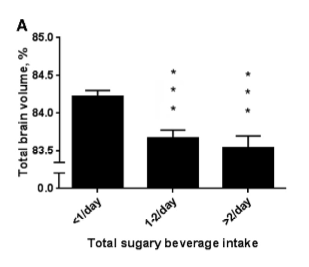
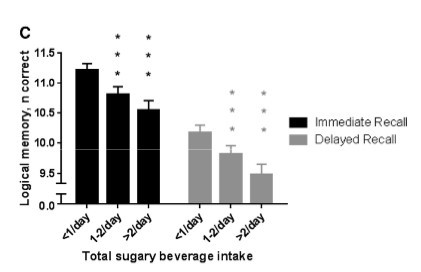
Figure 1. Association between total sugary beverage intake and A) total brain volume C) logical memory test performance [9].
While not surprising for soft drinks, the association also existed for 100% fruit juice which is considered by many to be healthy [10, 11].
The second study, using a cohort of 2,888 participants, found an association of artificially sweetened soft drinks with ischemic stroke, dementia and Alzheimer’s dementia. Surprisingly, the association was stronger for artificially sweetened beverages than for sugar-sweetened beverages which did not correlate with stroke incidence at all.
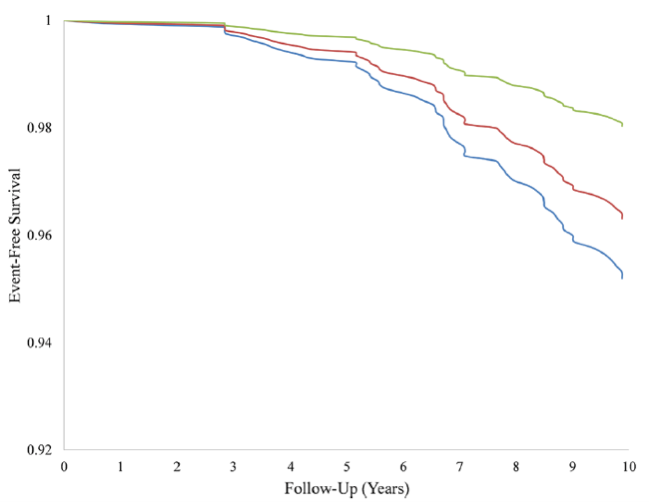
Figure 2. Incidence of all-cause dementia and consumption of artificially sweetened soft drinks. Green indicates consumption of 0/week, red is 6/week and blue is greater than 1/day. The figure is adjusted for age, sex, and total caloric intake [8].
The authors could not rule out the fact that diabetes is an independent risk factor for dementia and diabetics tend to consume more artificially-sweetened beverages which could confound the results.
Both studies were observational, precluding any sort of causal link. In other words, they showed an association, but can’t prove that sugary beverages are a cause of dementia. But they are certainly adding to a growing body of evidence against excess sugar and artificial sweetener consumption.
Of course, that’s nothing new here at The Paleo Diet where we have been pointing out the negative effects for years. Want to learn more? Check out just a few of the recent articles by Dr Cordain and our writers:
Artificial Sweeteners: Agents of Insulin Resistance, Obesity and Disease by Loren Cordain
Neurobiology of Sugar Cravings by Casey Thaler
Autism, Aspartame, and The Paleo Diet by Woodrow Monte
References
- Hu, F.B., Are refined carbohydrates worse than saturated fat? Am J Clin Nutr, 2010. 91(6): p. 1541-2.
- Malik, V.S., et al., Sugar-sweetened beverages, obesity, type 2 diabetes mellitus, and cardiovascular disease risk. Circulation, 2010. 121(11): p. 1356-64.
- Hu, F.B. and V.S. Malik, Sugar-sweetened beverages and risk of obesity and type 2 diabetes: epidemiologic evidence. Physiol Behav, 2010. 100(1): p. 47-54.
- Lakhan, S.E. and A. Kirchgessner, The emerging role of dietary fructose in obesity and cognitive decline. Nutr J, 2013. 12: p. 114.
- Kearns, C.E., L.A. Schmidt, and S.A. Glantz, Sugar Industry and Coronary Heart Disease Research: A Historical Analysis of Internal Industry Documents. JAMA Intern Med, 2016. 176(11): p. 1680-1685.
- Kearns, C.E., S.A. Glantz, and L.A. Schmidt, Sugar industry influence on the scientific agenda of the National Institute of Dental Research’s 1971 National Caries Program: a historical analysis of internal documents. PLoS Med, 2015. 12(3): p. e1001798.
- Welsh, J.A., et al., Consumption of added sugars is decreasing in the United States. Am J Clin Nutr, 2011. 94(3): p. 726-34.
- Pase, M.P., et al., Sugar- and Artificially Sweetened Beverages and the Risks of Incident Stroke and Dementia: A Prospective Cohort Study. Stroke, 2017. 48(5): p. 1139-1146.
- Pase, M.P., et al., Sugary beverage intake and preclinical Alzheimer’s disease in the community. Alzheimers Dement, 2017.
- Gill, J.M. and N. Sattar, Fruit juice: just another sugary drink? Lancet Diabetes Endocrinol, 2014. 2(6): p. 444-6.
- Boulton, J., et al., How much sugar is hidden in drinks marketed to children? A survey of fruit juices, juice drinks and smoothies. BMJ Open, 2016. 6(3): p. e010330.
blocks7copy1}
Trevor Connor, M.S.
Dr. Loren Cordain’s final graduate student, Trevor Connor, M.S., brings more than a decade of nutrition and physiology expertise to spearhead the new Paleo Diet team.
More About The Author